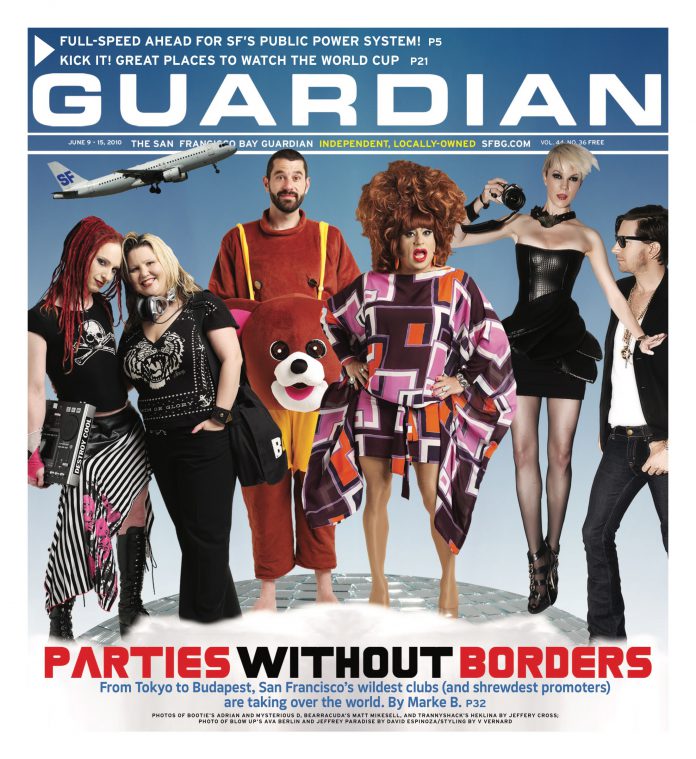arts@sfbg.com
FILM In the five years since Cristi Puiu’s improbable epic, The Death of Mr. Lazarescu (2005), a small group of philosophically-inclined filmmakers who were still young during the last days of Ceausescu have been disproportionately responsible for the minor masterpieces of world cinema. None of the Romanian films at Cannes (including Puiu’s follow-up, Aurora) nabbed a prize this year. But the three features in the Pacific Film Archive’s “Tales from the Golden Age: Recent Romanian Cinema” series — Lazarescu, 4 Months, 3 Weeks and 2 Days (2007), and Police, Adjective (2009) — were all heavily garlanded. They gain power when seen in series, where their common syntax comes into focus.
All three films unfold as underground odysseys. A character is tested in a series of trials flowing, directly or indirectly, from the state. In Lazarescu, the eponymous figure is sent upon a Styx-like course of hospitals, accompanied first by reproachful neighbors and then a willful medic. By the time the doctors correctly diagnose his original complaint of the stomach and head, his neurological condition has deteriorated to the point that he can no longer form the words himself. In 4 Months, we trace a young woman’s movements through the city as she ensures a safe course for her friend’s illegal abortion (the film is set two years before Ceausescu’s fall). As more and more is asked of her promise, the film’s handheld style comes to seem charged by irreversibility. In Police, Adjective, we watch a quiet young detective trail a dead-end case: he’s been assigned to gather evidence for a uselessly punitive drug bust of a few teenaged hash-smokers. When he finally refuses to order a raid, he gets an unexpected linguistics lesson from his chief (played with appalling charisma by Vlad Ivanov, the abortionist in 4 Months; in both films he seems the very embodiment of the banality of evil) who dismantles the detective’s logic word by word.
With narratives like case histories, peeling back a social situation until its very marrow is exposed, these films take no shortcuts to empathy. Morality is specifically broached, and each centers on protracted, tangled negotiations carried off by wonderful acting. The apparent detachment of the long-take style is deceptive. In fact, the films’ scenarios are rigorously worked out to express moral quandaries with concern for those on the receiving end. The ostensible real time of the long take is easily distended by exigent circumstances; the decision not to cut gives a taste of the agony, powerlessness, and tension that meet the characters. Indeed, the observational camera is an insinuation, drawing us into the complex ethical mechanics at the level of action and plot. They induce the presence of mind required to dislodge a nasty splinter. It’s difficult to imagine an American documentary taking on health care with an unblinking intransigence on par with Lazarescu, and this, more than the formal style, accounts for critics using the language of ethics and truth to describe the film.
By positioning individual characters at the margins of a centralized bureaucracy, the Romanian films certainly do illuminate untruths. Several of the broad shorts in the new omnibus film, Tales from the Golden Age, threaten to turn the gnomic quality of the Romanian films into shtick, but in the context of the PFA series, these “urban legends from the Ceausescu era” put a gentle historical spin on some of the leitmotifs of the earlier features. The best by far is The Legend of the Air Sellers, a tender 4 Months-meets-John Hughes film in which a teenage girl joins up with a scruffy older guy for a decidedly low-tech scam: they take bottles from local residents under the premises of collecting water and air samples for the state and then redeem the glass for change. The con is revealing of a central paradox of the period: that citizens could be frustrated by the state of things while at the same time credulous that the state would fix them. The girl is a natural capitalist, farming out bottle collecting to unwitting landlords; the boy, for his part, only really wants to watch VHS tapes on a prized video player.
Harun Farocki and Andrei Ujica’s found footage essay-film, Videograms of a Revolution (1992), is the outlier of the series both in terms of age and form, but in its methodical analysis of the Romanian Revolution of 1989 as a paradigmatic modern event, the film draws very close to the social relevance of the recent Romanian films — much closer than the nostalgia-tinged episodes of Tales from the Golden Age. Two sequences in Videograms loom large for the Romanian films in the PFA series. In the first, Ujica’s voice-over identifies an initial spark for the revolution in a moment of intercessional static, when an official camera trained upon Ceausescu’s scripted reality pans to observe a disturbance in the crowd, “more out of curiosity than resolve.” Then there are those bundled shots depicting newly victorious revolutionaries dug in at the political headquarters and TV station (an important location for Police, Adjective director Corneliu Poumboiu’s 2006 film, 12:08 East of Bucharest). Attempting to forge their initial reforms, they flail at the deeply ingrained restraints of institutional language.
Toward the end of Videograms, we watch dramatic embedded footage of ragtag revolutionaries and other civilians taking cover from sniper fire coming from one of the oppressive high-rise buildings that play such a prominent part in the Romanian cinematic imagination. Ujica’s voice-over takes analytical measure of the scene: that the belief in an enemy is a binding legacy, a “recollected habit,” and that the unspoken fear so long deployed by Ceausescu’s regime as “internal tactic of deterrence” will not simply vanish. The new Romanian cinema was surely born in the shadows of this phantom fighting.
TALES FROM THE GOLDEN AGE: RECENT ROMANIAN CINEMA
June 11–June 27, $5.50–$9.50
Pacific Film Archive
2757 Bancroft, Berk.
(510) 642-5249

